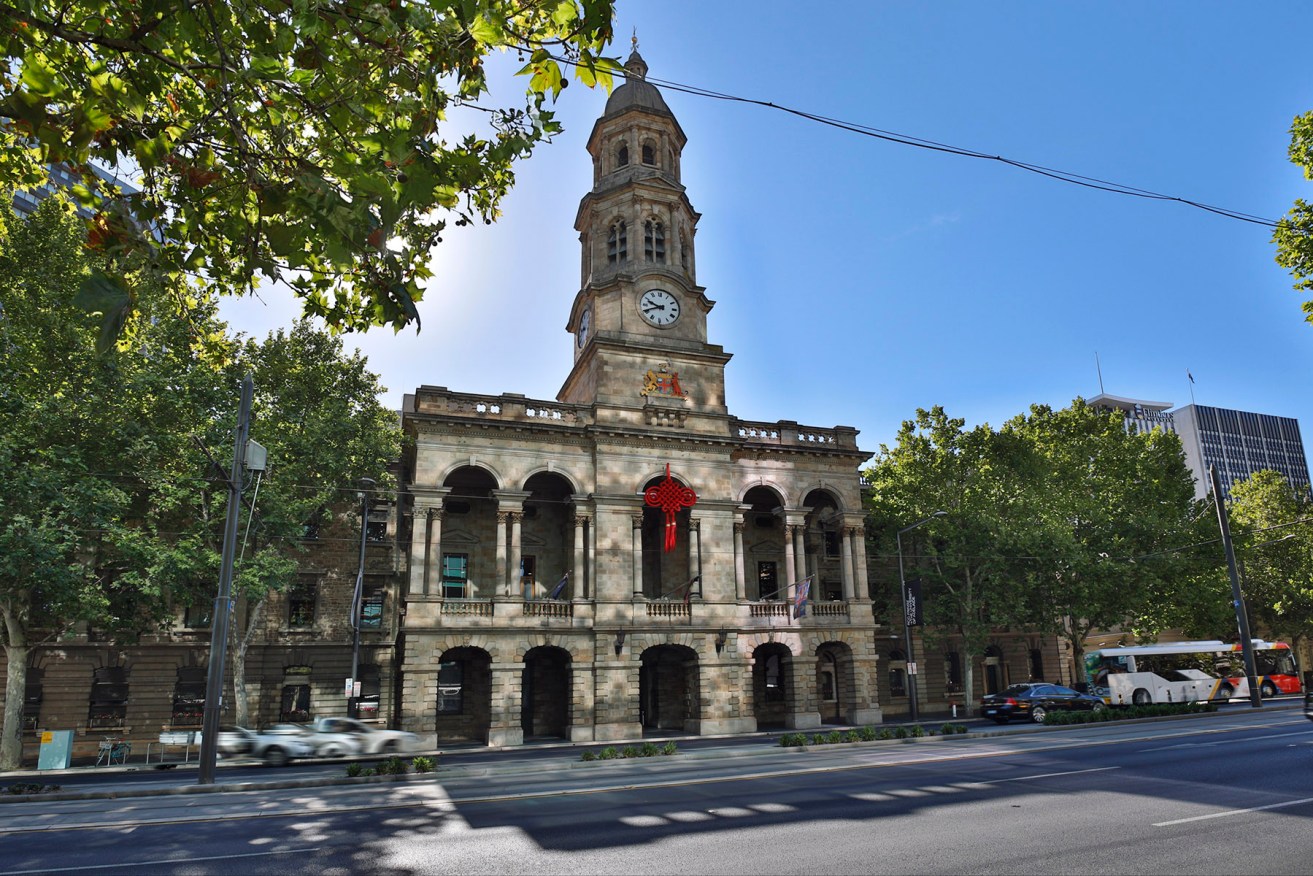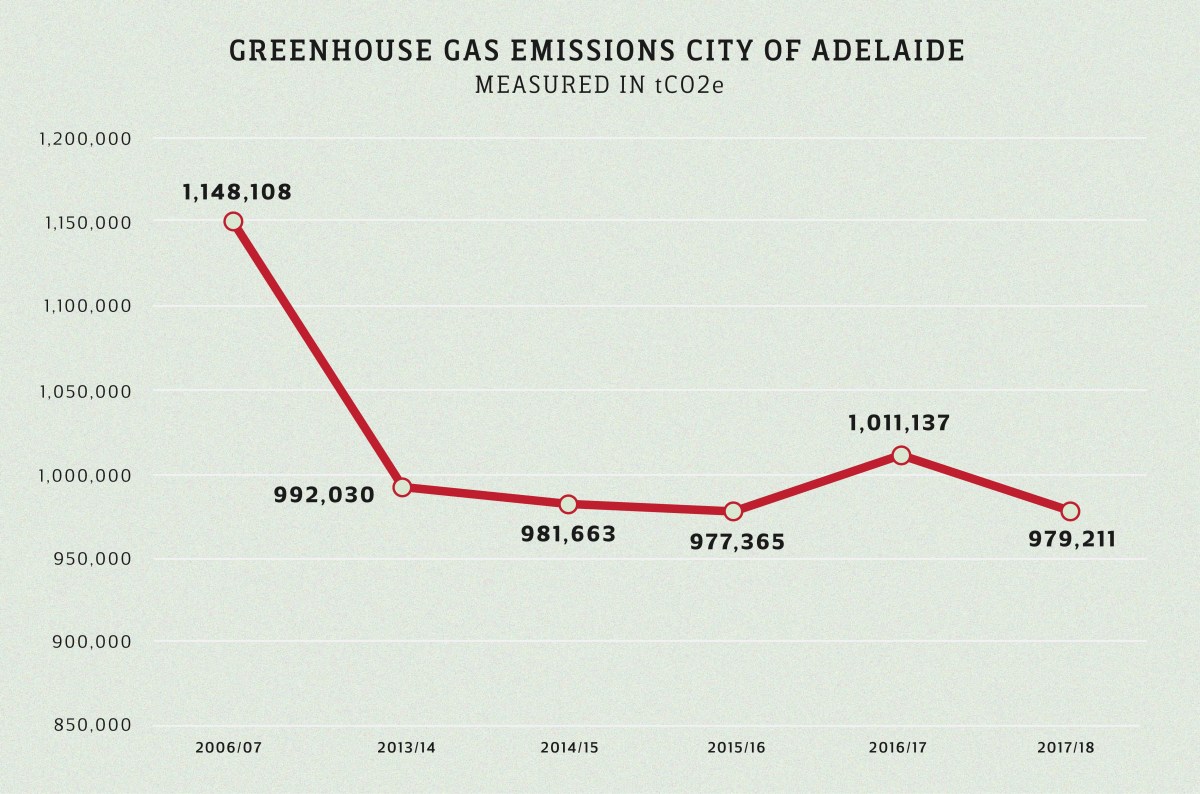Renewable energy to fully power city council
Adelaide City Council says it will become South Australia’s first carbon neutral local government by the end of this year following the signing of a “landmark” renewable power purchase agreement.

Photo: Tony Lewis / InDaily
Lord Mayor Sandy Verschoor this morning announced the council had entered into an agreement with Melbourne-based energy retailer Flow Power to source all its electricity from solar and wind power.
The contract means all council-owned infrastructure and buildings – including street lights, libraries, community centres and Town Hall – will be powered by 100 per cent renewable energy from July.
The switch is expected to slash the council’s current carbon emissions – more than half of which are tied to electricity use – by 11,000 tonnes each year.
Verschoor told reporters this morning the agreement would result in a 20 per cent reduction to the council’s electricity costs, however she said she was “not allowed to talk dollars” due to commercial confidentiality.
She said the agreement would mean the council would become carbon neutral-certified by the end of this year, joining the already-certified Brisbane, Sydney and Melbourne city councils.
Carbon neutrality, or having a net-zero carbon footprint, is achieved when the amount of greenhouse gas emissions emitted into the atmosphere is balanced by the amount being removed.
“This partnership will not only save our ratepayers money, it helps cement Adelaide’s international clean and green reputation,” Verschoor said.
“It’s a really big step in Adelaide’s journey to take on climate change action.”
Flow Power will source the electricity from Clements Gap wind farm in the state’s far-north and two recently acquired Tetris Energy solar farms at Streaky Bay and Coonalpyn.
The company’s co-founder, David Evans, said the vast majority of the electricity generated from those locations would be consumed by the council.
He said the contract would “create new jobs, new opportunities both in the construction, development and ongoing maintenance”, but he was unable to specify the exact number.
‘We have seen significant growth since opening our Adelaide office and are committed to driving the uptake of renewable energy in the state for the long-term,” Evans said.
“We view this as a long-term partnership, which will empower the city to fulfil its ambitious climate commitments and create opportunities to support the energy system.”
The council says solar panels already installed on some of its buildings, including Town Hall, the Adelaide Central Market and Aquatic Centre, have saved over a quarter of a million dollars each year.
Meanwhile, the council is still working in partnership with the State Government to deliver Carbon Neutral Adelaide – a separate agreement signed with the Weatherill Government in 2015 to make Adelaide “the world’s first carbon neutral city”.
In implementing the agreement, the council has since endorsed the distinctly less lofty target of being “one of the world’s first carbon neutral cities by 2025” whereas the former Government had maintained the “world’s first” target without a specific deadline.
Asked how the agreement was progressing, the council’s sustainability associate director Michelle English said it was a “very ambitious goal that we’re working towards”.
“We are doing everything that we can to reach it,” she said.
According to the latest update published in July last year, carbon emissions in the Adelaide City Council area reduced by 15 per cent from the 2007 to 2018 financial years.
There was a dramatic reduction in emissions between 2014 and 2015, a less significant reduction between 2015 and 2016 and a slight increase in emissions between 2016 and 2017.
Between 2017 and 2018 emissions dropped again, but the level was still above what was recorded in 2016.

The CBD and North Adelaide’s carbon emissions have been falling, but the pace of reductions has slowed over time. Data: ACC. Image: Nicky Capurso / InDaily.
The overall reduction in emissions was driven by a 35 per cent decline in energy emissions – boosted by the rapid growth in renewable electricity.
Over the same time, transport emissions increased by 27 per cent and waste emissions increased by six per cent.
The city’s gross regional product also increased by 33 per cent, which the council said demonstrates a decoupling of greenhouse gas from economic growth.
The July update shows only 18 of the 104 actions identified to achieve carbon neutrality in the city were completed.
Eighteen actions were listed as “ongoing/annual”, 59 were “in progress” and nine were “not started”.
Environment Minister David Speirs told InDaily in 2018 that he would review his department’s programs to ensure they deliver “practical environmental outcomes”.
In December last year, Speirs released the “Directions for a Climate Smart South Australia” statement, which outlines how the Government would address the impacts of climate change.
The statement did not mention Carbon Neutral Adelaide.
InDaily contacted Speirs this morning asking whether the Government still supports Carbon Neutral Adelaide but is yet to receive a response.
Want to comment?
Send us an email, making it clear which story you’re commenting on and including your full name (required for publication) and phone number (only for verification purposes). Please put “Reader views” in the subject.
We’ll publish the best comments in a regular “Reader Views” post. Your comments can be brief, or we can accept up to 350 words, or thereabouts.
InDaily has changed the way we receive comments. Go here for an explanation.




